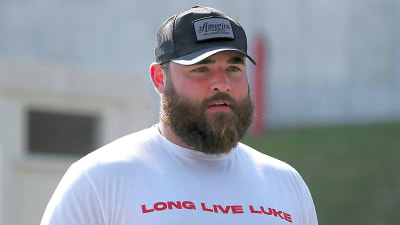
With their backs against the wall, the Edmonton Oilers have no choice but to win the next two games against the Florida Panthers. A second straight defeat in the Stanley Cup Final is precariously close, where a single shot might end the Oilers season.
As such, goaltending is unavoidably a huge piece of the conversation. Coach Kris Knoblauch is growing a reputation of having a more dynamic or fluid state to his lineups. This has been evidenced throughout his time with the Oilers, in this playoff run, and within this series against the Panthers.
There might be no greater example than the decision to start the previously undefeated Calvin Pickard in Game 5. Let’s take a closer look at what goes into deciding which goalie will start Game 6.
Credit due to both goaltenders
Pickard has often been thought of as a journeyman, ideal for a third string role. Since shipping off Jack Campbell, Pickard has been elevated. Many around the league might not be ready to admit that Pickard has delivered on his extended opportunity. He is owed some credit as a goalie who can handle a backup role, or at least one who has for the better part of two seasons now.
All the same, Stuart Skinner deserves credit as well. After Mike Smith and Mikko Koskinen left the team the same offseason, Skinner was getting his first opportunity at a full time NHL role as Campbell’s backup. Not a high draft pick, Skinner had strung together an improving AHL resume, outperforming expectations for consecutive seasons. It was not long until Skinner had all but wrestled the starting job from Campbell, or at least made it an open competition.
Since then Skinner has been thrust into the spotlight, shouldering the hopes of not only an aspiring champion, but one with two of the NHL’s all-time greats. Without time to stabilize as an NHL backup, or even to feel his way through a starting job with less pressure, Skinner has had nowhere to hide. Some might feel that Skinner could never be a true starter, but he has already been doing so.
Skinner’s goaltending so far
Of course, Skinner is not a favourite for any Vezina Trophy consideration in the future. The lateral movement is not as graceful and dynamic as Sergei Bobrovsky’s, for an unfair example. He seems to have volatile streaks and swings, though the Oilers inconsistencies are often coinciding with his weakest moments. This playoff run began with two horrid games from Skinner, but frankly the Oilers were equally culpable of these poor performances. The team simply was not playing up to standard.
This was even more true in Game 4, Skinner’s most recent appearance. Pulled after the first period, Skinner allowed three goals, putting the Oilers behind. The truth is that it might have been much worse had the Oilers not gotten some huge saves from Skinner. Arguably the best Oiler in that period, it was Skinner who paid the price.
Despite his alleged inconsistencies, Skinner ranks tenth in games played and seventh in wins over the past three seasons, as well as fifteenth among goalies with at least 100 games over that same period. Skinner is also tied for ninth among active goalies in playoff wins, and tenth among active goalies for playoff shutouts. While Skinner is not among the league’s elite, and has the strength of a contending team in front of him, he has still been the one who got the job done.
Skinner still deserves a lot of credit
Not often mentioned is that Skinner has a history of winning, having won a WHL championship in 2017–18, as well as an AHL championship in 2020–21. Born in Edmonton, Skinner is a third-round pick who has consistently improved, outperformed his contract, and backstopped the best Oilers teams of the salary cap era.
For a team that has struggled to develop goaltenders for years, and a country that has questioned its goaltending program as a whole, Skinner has all the makings of a hometown hero. Instead, he is often dismissed and doubted. As much as Skinner’s shortcomings are mentioned, as much as the Oilers could acquire an upgrade this offseason, Skinner is due a lot of credit.
Goalies can be mercurial by nature, difficult to project, quantify, and explain. Fellow 1998 birth year goalies like Jeremy Swayman and Jake Oettinger are often thought of as far beyond Skinner. Over the past three seasons, taking the trio from the end of their early careers to their primes, Skinner compares more favourably to these elite goalies than public opinion would like to admit. While few would suggest that Skinner is as good as Oettinger or Swayman, in terms of cap value there is a lot to like for the Oilers.
Who to start Game 6?
Knoblauch has consistently delivered on lineup changes to get the most from his team, so it is hard to nitpick every decision too critically. Even so, Pickard had played well enough to earn the Game 5 start, or at least to warrant a hunch. After helping the Oilers out of a tricky spot several times over the past two seasons, not to mention a previously unblemished playoff record, Pickard has the trust of his teammates.
Once more the Oilers proved that the issue was not goaltending alone, for the most part being outplayed by the Panthers in the series. Through the first two games the Oilers might have been the better team, so there is hope that they can rediscover their form. With at most two games left in their season, the time is now for the Oilers to find out.
This means turning to Skinner to start Game 6. The jeers of the Panthers faithful await, and the Oilers must deliver the best version of themselves for their goal to survive. Obviously it would be nice to have a multi-time Vezina Trophy winner like Bobrovsky in net, but Skinner has continued to earn this opportunity.
What to do next season
In fairness to both possible outcomes, the Oilers intentional strategy to extract reasonable goaltending out of limited cap dollars and draft capital has given them a chance. Perhaps the strategy is worthy of questioning, but that fault does not belong to Skinner or Pickard. Both goalies have been resilient, cooperative, competitive, and vital to the team’s journey here. They have delivered more to the Oilers than anyone imagined when the team acquired them.
Going forward it would seem unwise not to at least explore upgrading the position, if not only by giving Skinner more aggressive competition. The same might be said for the goaltending coaching staff within certain corners of Oil Country, not helped by Skinner’s season-to-season decrease in save percentage. Two wins can change a lot of things.
More must-reads:
- Five takeaways as Panthers officially become an NHL dynasty
- With Oilers loss, Canada's Stanley Cup drought rolls on
- The '5+ goals in one Stanley Cup Final in the Modern Era' quiz
Customize Your Newsletter
 +
+
Get the latest news and rumors, customized to your favorite sports and teams. Emailed daily. Always free!







